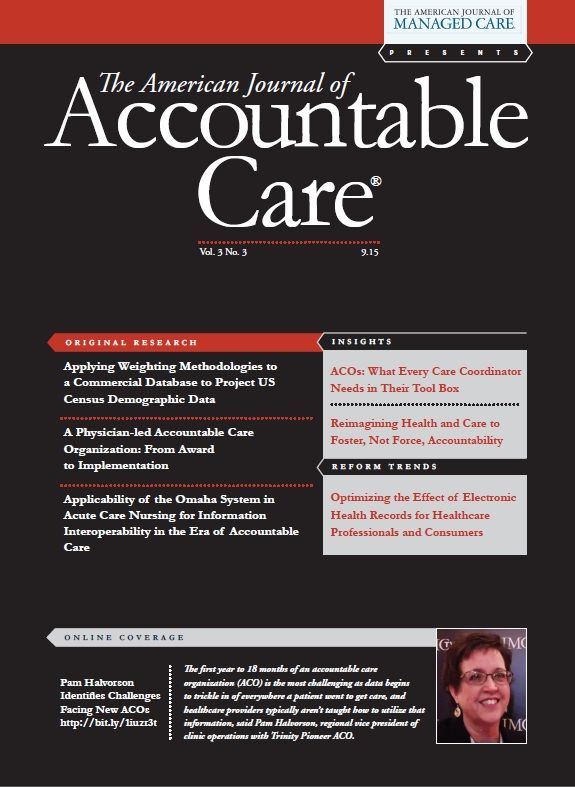- Center on Health Equity & Access
- Clinical
- Health Care Cost
- Health Care Delivery
- Insurance
- Policy
- Technology
- Value-Based Care
Transitioning Our Healthcare System Toward Accountable Care
Transitioning to a healthcare system based on accountable care presents many challenges, though the potential benefits may be well worth the effort.
The transition from a healthcare system based on fragmented fee-for-service payments to one of an accountable system based on an episode or global payment models has generated considerable enthusiasm. Proponents note that a system based on accountable care can constrain spending growth and improve quality, and in fact, existing evidence suggests cautious optimism.1,2 HHS has set out a goal to move 50% of payments to these episode or global payment models by 2018.3 Yet, from the perspective of providers, the new environment presents many challenges. This transition involves a change in business models, and as such, it calls for the reexamination of the myriad of systems that drive the provision of care. This issue of The American Journal of Accountable Care (AJAC) focuses on some specific examples surrounding this change and the emphasis on use of health information technology (IT).
To highlight a few of those examples from this issue, in their study, Steckler et al specifically examine challenges for physician- led organizations seeking to transform from a fee-for-service system toward one of accountable care. They identify several common issues, including underutilization of IT and few care management tools, but addressing these challenges is complicated by a lack of resources. To combat this, the authors recommend a thorough assessment of existing gaps and resource allocation in order to properly gauge ACO readiness early on in the implementation process.
Alvandi examines the role of electronic health records (EHRs) in a transformed, accountable healthcare system. The potential of EHRs to facilitate information flows to support better care at a lower cost is noted, but it is important to recognize both the multidimensionality of EHR systems as well as the obstacles associated with adoption. Training is crucial, and moreover, acceptance by providers and patients is still a challenge. Managers must recognize that EHRs are not systems to be adopted and then forgotten once in place, but rather, they must evolve as technology, management needs, and capabilities all change.
Oliver and Bacheller focus on the role of care coordination tools for supporting accountability. They identify several important aspects of these tools: first and foremost, tools must be tailored to the population; plans serving Medicaid patients will have different requirements than those serving commercial patients. Also, tools must facilitate use by having a single access point in order to get a view of the entire panel and allow easy application of care guidelines. The facilitation of improved communication is another important aspect of care coordination and health management tools—not only between providers, but between other systems as well, such as is accomplished with the EHR.
These articles, as well as Monsen et al and Wasser et al, emphasize the important role that IT will have in the healthcare system of the future. In many ways, we are at the beginning of the accountable care journey. Success is not guaranteed; IT can help, but is no panacea. Continued work to identify effective IT systems and strategies related to implementation will be needed. At AJAC, we hope to continue to provide related useful information.
REFERENCES
in health care spending and quality 4 years into global payment. N Engl J Med.
2014;371(18):1704-1714.
1. Song Z, Rose S, Safran DG, Landon BE, Day MP, Chernew ME. Changes
response to Soumerai and Koppel. The Incidental Economist blog. http://theincidentaleconomist.
com/wordpress/mcwilliams-et-al-response-to-soumerai-and-koppel/.
Published May 5, 2015. Accessed September 8, 2015.
2. McWilliams M, Chernew ME, Landon BE, Schwartz AL. McWilliams et al.
people. HHS blog. http://www.hhs.gov/blog/2015/01/26/progress-towards-better-
care-smarter-spending-healthier-people.html. Published January 26, 2015. Accessed
September 8, 2015.
3. Burwell SM. Progress towards achieving better care, smarter spending, healthier

Quality of Life: The Pending Outcome in Idiopathic Pulmonary Fibrosis
February 6th 2026Because evidence gaps in idiopathic pulmonary fibrosis research hinder demonstration of antifibrotic therapies’ impact on patient quality of life (QOL), integrating validated health-related QOL measures into trials is urgently needed.
Read More
Blister Packs May Help Solve Medication Adherence Challenges and Lower Health Care Costs
June 10th 2025Julia Lucaci, PharmD, MS, of Becton, Dickinson and Company, discusses the benefits of blister packaging for chronic medications, advocating for payer incentives to boost medication adherence and improve health outcomes.
Listen

